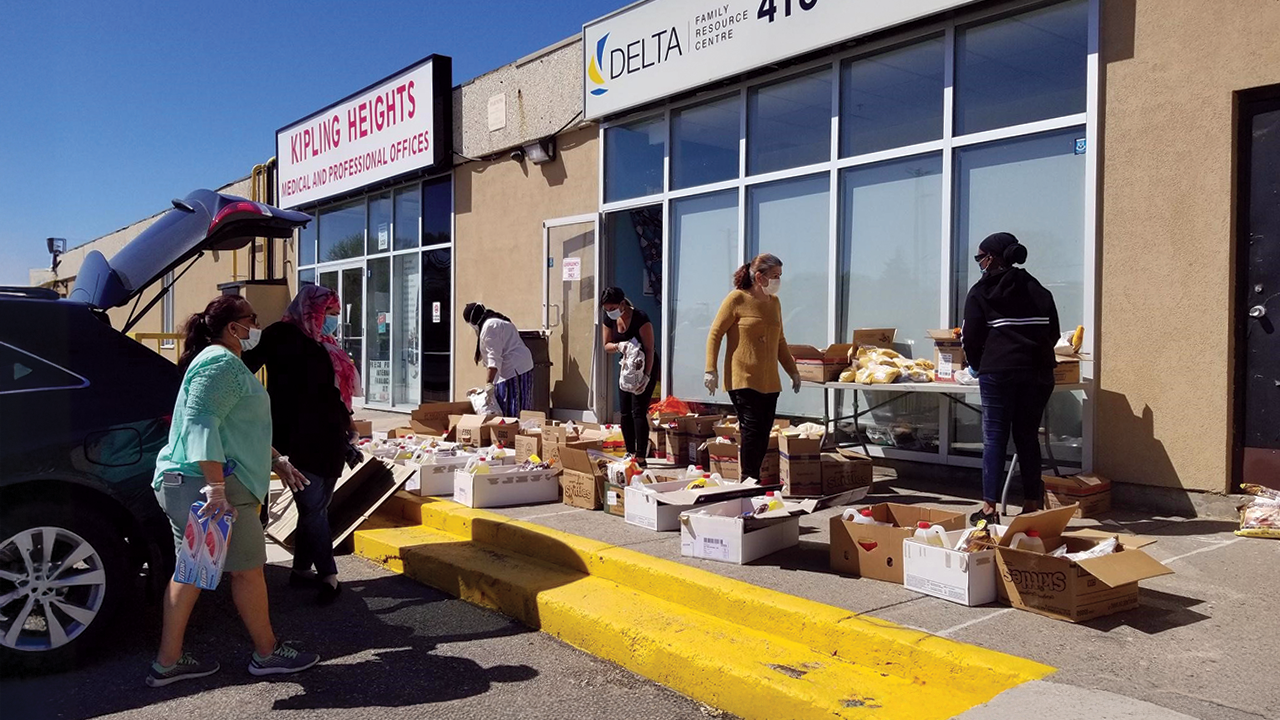
10 equity-deserving agencies share how long-term United Way Anchor Agency funding is fueling community-led change across the GTA.
Poverty doesn’t affect everyone equally. Indigenous, Black, racialized and other equity-deserving communities — including people with disabilities and 2SLGBTQIA+ individuals — face deeper, systemic barriers to opportunity. That means they’re more likely to experience unemployment, housing instability, food insecurity and limited access to education and health care.
At United Way Greater Toronto, we’re breaking down barriers alongside community agencies that understand those challenges.
One way we support their impact is through Anchor Agency funding — flexible and dependable five-year support for both operations and programming. Currently, 81 agencies delivering nearly 230 programs across the GTA receive Anchor funding. It helps them meet urgent needs, fill critical service gaps and build long-term solutions to poverty.
We recently expanded this support to an additional 14 organizations led by and serving equity-deserving communities. These agencies bring lived experience, trusted relationships and proven, tailored supports — from culturally relevant mental health care to youth mentorship and employment programs that meet people where they are. They’re closing opportunity gaps and pushing for the systemic change our region needs.
We spoke with 10 leaders of equity-deserving agencies included in the funding expansion. In this Q&A, they share how long-term, reliable funding is helping them empower the communities they serve.
Before receiving Anchor Agency funding, what were the biggest challenges your agency faced in terms of financial stability and long-term planning?
Andrine Johnson, Chief Executive Officer, Embrave Agency to End Violence
Our biggest challenge was that we were not able to have a dedicated human resources manager due to financial instability. The team couldn’t follow through on human resources needs, and there were issues with high staff turnover.
Embrave Agency to End Violence is an anti-violence organization providing shelter, counselling and advocacy supports for women, Two-Spirit, genderqueer, trans and non-binary folks and their children experiencing any form of violence in the Region of Peel and beyond.
Lorris Herenda, Chief Executive Officer, Yellow Brick House
The COVID-19 pandemic created major human resources challenges that we didn’t have the capacity to address, including staff burnout, retention issues and growing concerns around employee wellness due to the complexity and volume of client challenges and systemic barriers.
Yellow Brick House provides life-saving services and prevention programs to meet the diverse needs of individuals, families and communities impacted by violence.
Kemi Jacobs, Executive Director, Delta Family Resource Centre
Being able to cover administrative costs was our biggest challenge, as well as being competitive and in a position to retain experienced staff.
Delta Family Resource Centre offers programs, services and supports for Black and other priority populations in Northwest Toronto that amplify their resilience and strengths.

Can you share an example of how Anchor Agency funding has strengthened your ability to serve your community?
Nancy Martin, Executive Director, Miziwe Biik Aboriginal Employment and Training
The security of this funding allowed us to expand our services. This year, we opened a training centre dedicated to the construction trades at a new facility in the West Donlands. Having our own facility has the ability to better serve and retain and instil pride in the Indigenous young people who are seeking a career in the trades.
Miziwe Biik Aboriginal Employment and Training serves the employment and training needs of Indigenous peoples in the Greater Toronto Area.
Susan Dobson, Executive Director, Krasman Centre
Thanks to the security of this five-year funding, we’ve been able to offer mental health and substance use peer support groups that are led by and designed specifically for Black, Indigenous and other racialized communities, as well as 2SLGBTQIA+ individuals. We’ve also enhanced DEI training and resources for staff delivering this peer support. These and other ongoing learning opportunities continue to enhance and improve our team’s capacity to offer culturally safe and appropriate programs reflective and responsive to the communities we serve.
Krasman Centre is a consumer/survivor initiative that offers peer support-based programs, physical hubs and resources for people with lived experience of mental health, substance use and housing challenges and their family and friends.
Wendy Porch, Executive Director, Centre for Independent Living in Toronto
Anchor funding has been a win for us! It’s allowed us to innovate in the programs we offer. For example, we are currently using our Anchor funding to run our Foundations of Disability Inclusion Training program, which was developed by people with lived experience of disability and is delivered by disabled people. This helps all social service agencies be better at including and amplifying voices from our community within their organization.
Centre for Independent Living in Toronto is a consumer-controlled, community-based resource organization helping people with disabilities to learn independent living skills and integrate into the community.
Jeff Msangi, Programs Manager, African Community Services of Peel
This funding has been transformative and allowed us to invest in building capacity and hiring and retaining skilled staff while deepening our relationship with the communities we serve across Peel Region. We can confidently commit to collaborating with other organizations and co-designing responsive programs with more impact. We can take the time to evaluate what’s working, anticipate emerging challenges and adjust our approaches accordingly.
African Community Services of Peel is a registered not-for-profit community-based charitable agency that provides newcomer settlement services to the Black/African community in Peel Region and the surrounding areas.
Adeena Niazi, Executive Director, Afghan Women’s Organization
This funding has enabled us to plan for the future while also meeting today’s rising demand for services, such as mental health support, trauma-informed care and food security. For example, we launched the Community Food Hut initiative, which allowed us to distribute food supplies to 7,257 adults and 746 seniors.
The Afghan Women’s Organization provides settlement services to all newcomers, with a special focus on women, their families, refugees and people who have experienced war and persecution.
Kemi Jacobs, Executive Director, Delta Family Resource Centre
With less dependency on restricted resources, we have been able to better support clients by providing wraparound supports, like gift cards to purchase food and necessities when they have been in crisis. It also allows us to start addressing salary gaps on our management team.
Looking ahead, what opportunities does Anchor Agency funding open up for your agency and the community you serve?
Kemi Jacobs, Executive Director, Delta Family Resource Centre
Alongside our partners, Delta Family has initiated the opportunity to provide supportive housing in North Etobicoke. With more financial breathing room, we can hire a part-time housing lead to support this project, which we see as a key area for growth.
Susan Dobson, Executive Director, Krasman Centre
Looking ahead, this funding allows us more space to breathe. We can better leverage the unique gifts and skills of our peer support staff who have so much more to offer. It allows for a stronger administrative team that can empower us to explore more opportunities in programming, advocacy and community engagement.

How has Anchor Agency funding helped you respond to emerging community needs, challenges or crises?
Adeena Niazi, Executive Director, Afghan Women’s Organization
Anchor funding has enabled our organization to adapt to emerging community needs, such as the surge of refugees arriving from conflict zones. We’ve been able to mobilize resources to provide timely settlement support, language services and trauma counselling. We’re also responding to gender-based violence, which disproportionately affects refugee women, by creating safe spaces for dialogue and advocacy where individuals can learn about and take a stand against the cycle of violence that too often goes unspoken.
Susan Dobson, Executive Director, Krasman Centre
Our direct service team and programs have continued to grow and expand to respond to increasing community needs and crises directly including supporting those who are unhoused, experiencing food insecurity and those impacted by the opioid emergency — this puts ever-increasing demands on our administrative team. Our flexible Anchor Agency funding has allowed us to increase staffing capacity to meet these additional demands and support our communications strategies to better share news and updates. Other staff have been able to respond to community engagement opportunities, representing us at critical community tables and committees like York Region’s Community Opioid and Drug Response Collaborative.

How has the stability of Anchor Agency funding affected your capacity to focus on impact rather than administration?
Nayani Nandakumar, Manager of Community Development, Council of Agencies Serving South Asians
Instead of diverting energy toward constantly securing new grants, we can allocate more of our time and resources to directly serving our community and refining our initiatives. Long-term funding also fosters stronger relationships with our stakeholders and partners, as they can trust in our ability to commit to long-term projects, programming, research and advocacy. Ultimately, the shift from a cycle of grant applications on a yearly basis to a focus on sustainable impact creates an environment where we can innovate, learn and grow without the constant pressure of administrative and operational burdens.
The Council of Agencies Serving South Asians is an umbrella organization of agencies, groups and individuals that provide services to the South Asian Community.
Nancy Martin, Executive Director, Miziwe Biik Aboriginal Employment and Training
Expanding is costly, and developing a new project has some uncertainty. Having core funding to address the administrative costs of operating or hiring additional staff helps to stabilize new projects.
Andrine Johnson, Chief Executive Officer, Embrave Agency to End Violence
Now that we will be receiving consistent funding and only have to report annually, we can bring time and attention to the needs of staff, including their professional development, social wellness and work-life balance.
Kemi Jacobs, Executive Director, Delta Family Resource Centre
Words cannot express the tremendous impact that sustained funding has on an agency like Delta Family, where much of the grant writing is done in-house. The “new” time created by the Anchor funding is spent on long-term planning, developing and nurturing networks and partnerships, and implementing programs that enable us to meet evolving demands.
Susan Dobson, Executive Director, Krasman Centre
Without the administrative burden that often comes with frequent reporting requirements and the need to re-apply for funding on an annual basis, we have more capacity to focus on impact and long-term plans that require ongoing actions. One example is that we now have a solid and detailed Health Equity Work Plan and Indigenous Health Equity Workplan, that guides our work and enables us to measure and track our progress and impact and we’re looking forward to implementing a Black Healthy Equity Plan for the future.
POWERED BY COMMUNITY, ROOTED IN EQUITY
With Anchor funding, community agencies aren’t just meeting urgent needs — they’re building momentum, strengthening infrastructure and creating space for bold ideas. Their work is changing lives today while shaping a more equitable tomorrow. United Way is proud to stand alongside them — not just as a funder, but as a partner in the movement for lasting change. Together, we’ll keep confronting inequities and building a region where everyone can thrive. Any way we can.
*Answers may have been edited for length and clarity